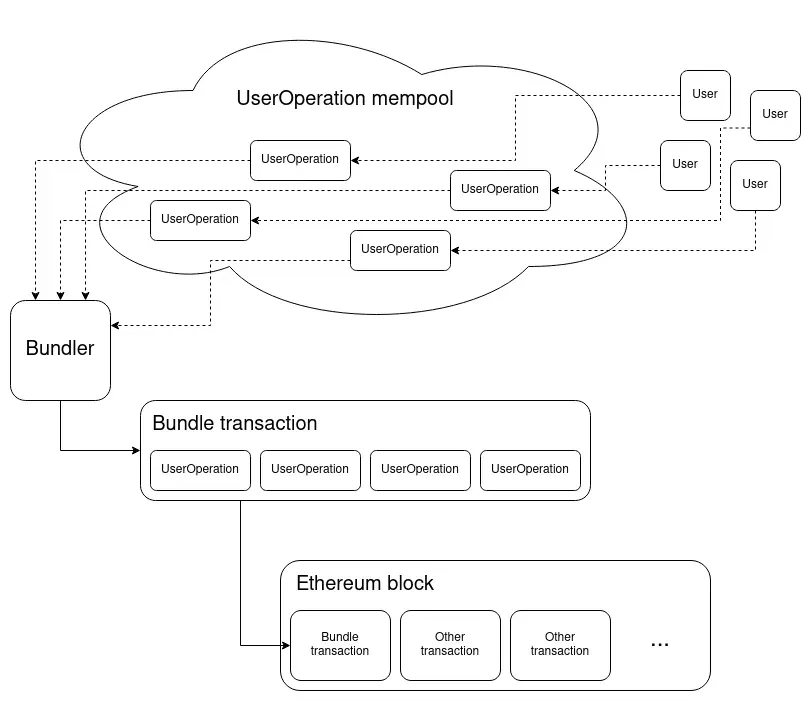What is Account Abstraction in Ethereum and Why We Need It
Account abstraction is a concept proposed within the Ethereum ecosystem aimed at making smart contracts more user-friendly and flexible. It seeks to simplify the user experience by abstracting away the complexities involved in transaction management and smart contract interactions. Here’s a breakdown of its key features and goals:
Traditional Ethereum Accounts
Ethereum has two types of accounts:
- Externally Owned Accounts (EOAs): Controlled by private keys and can initiate transactions.
- Contract Accounts: Controlled by their contract code and can only act in response to transactions they receive.
Problems with the Current Model
- User Experience: The need for EOAs to initiate transactions can complicate the user experience, especially for those not familiar with blockchain technology.
- Security: Managing private keys securely is challenging for many users.
- Limited Functionality: EOAs have limited capabilities compared to smart contracts, such as automatic transactions or more complex logic for managing assets.
Why we Need Account Abstraction
Account abstraction is pursued in the Ethereum ecosystem for several reasons, aiming to address limitations in the current account model and enhance the overall user and developer experience. Here are the primary motivations behind the need for account abstraction:
1. Improved User Experience
- Simplified Management: Users currently need to manage private keys for their externally owned accounts (EOAs), which can be cumbersome and confusing, especially for those not technically adept. Account abstraction allows for a more seamless interaction with the Ethereum network, potentially enabling users to interact with smart contracts directly without managing separate EOAs.
- Advanced Authentication Methods: It allows for more sophisticated authentication mechanisms, such as multisig wallets or social recovery, directly at the account level, without the need for additional layers or contracts.
2. Enhanced Security Features
- Custom Security Policies: Account abstraction enables the creation of accounts with custom security policies, such as limiting transactions based on certain conditions, time locks, or allowing transactions only if approved by a decentralized autonomous organization (DAO).
- Recovery Options: Traditional EOAs do not have built-in recovery options if private keys are lost. Account abstraction can introduce native mechanisms for account recovery, improving security and user confidence.
3. Increased Flexibility and Functionality
- Complex Logic for Transactions: With account abstraction, users can employ contracts to define complex logic for executing transactions, such as automated payments, subscriptions, or conditional transactions based on external events.
- Integration with DeFi and Other Applications: Easier integration with decentralized finance (DeFi) applications and other blockchain-based services, as users can directly interact with these platforms through their abstracted accounts, potentially enabling new use cases and functionalities.
4. Streamlining Development
- Uniform Account Model: It creates a more uniform account model where the distinction between contract accounts and EOAs is minimized, simplifying the development and deployment of smart contracts and dApps.
- Ease of Onboarding: For developers, it means less friction in creating user-friendly applications, as the abstraction can handle many of the complexities and security concerns associated with account management and interactions.
5. Addressing Scalability and Efficiency
- Optimization of Transactions: By enabling more complex transaction logic to be executed within accounts, there’s potential for optimizing how transactions are processed and reducing the overall network load, contributing to scalability and efficiency improvements.

Current Status
As of my last update, various proposals (EIPs - Ethereum Improvement Proposals) related to account abstraction have been discussed within the Ethereum community. The actual implementation would require broad consensus and thorough testing to ensure that it enhances the platform without introducing new risks.
Account abstraction represents a significant step towards making Ethereum and blockchain technology more accessible and powerful for a broader range of applications and users. However, it’s a complex initiative that needs careful planning and implementation.
Conclusion
Account abstraction is seen as a way to make Ethereum more accessible, secure, and versatile for users and developers alike. By abstracting away the complexities of the current account system and enabling more flexible account functionalities, Ethereum aims to enhance its usability and encourage broader adoption of blockchain technology. However, implementing account abstraction requires careful consideration of its technical and security implications, as well as substantial changes to the Ethereum protocol.